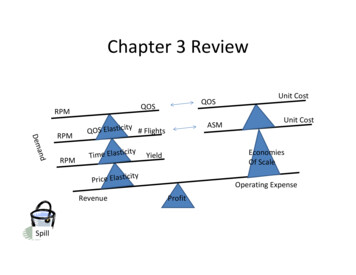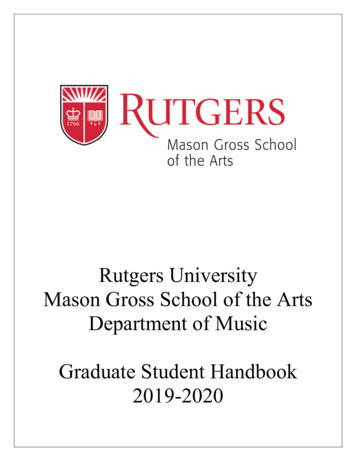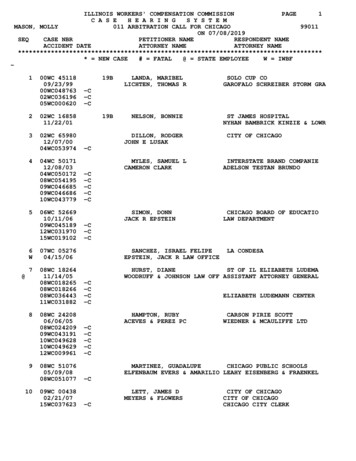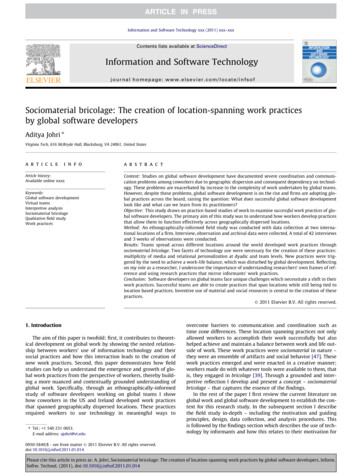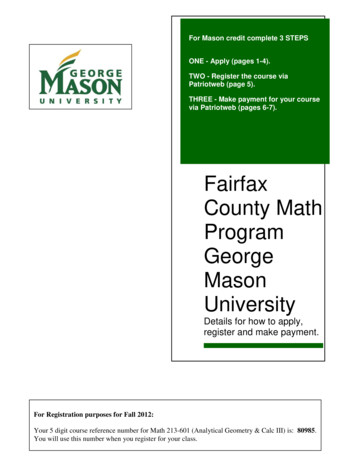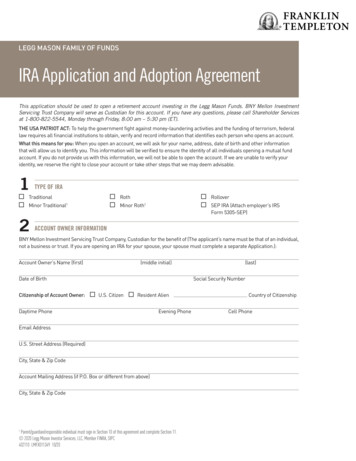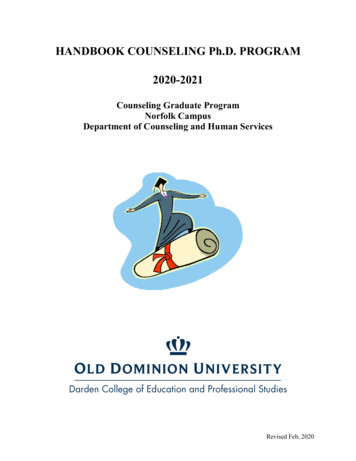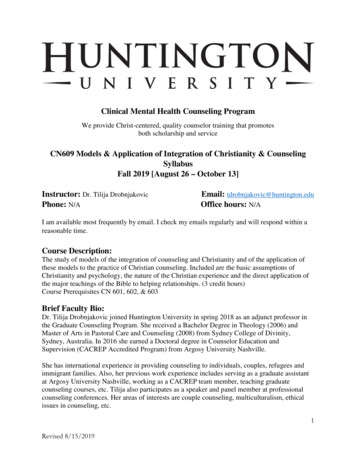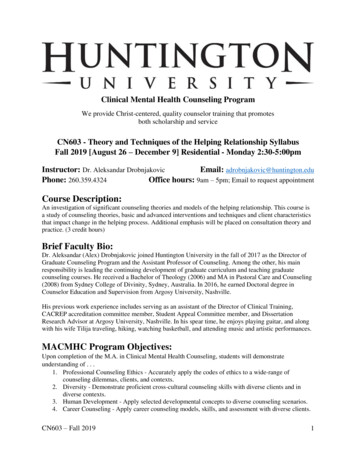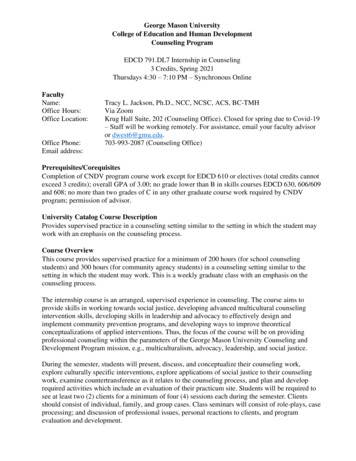
Transcription
George Mason UniversityCollege of Education and Human DevelopmentCounseling ProgramEDCD 791.DL7 Internship in Counseling3 Credits, Spring 2021Thursdays 4:30 – 7:10 PM – Synchronous OnlineFacultyName:Office Hours:Office Location:Office Phone:Email address:Tracy L. Jackson, Ph.D., NCC, NCSC, ACS, BC-TMHVia ZoomKrug Hall Suite, 202 (Counseling Office). Closed for spring due to Covid-19– Staff will be working remotely. For assistance, email your faculty advisoror dwest6@gmu.edu.703-993-2087 (Counseling Office)Prerequisites/CorequisitesCompletion of CNDV program course work except for EDCD 610 or electives (total credits cannotexceed 3 credits); overall GPA of 3.00; no grade lower than B in skills courses EDCD 630, 606/609and 608; no more than two grades of C in any other graduate course work required by CNDVprogram; permission of advisor.University Catalog Course DescriptionProvides supervised practice in a counseling setting similar to the setting in which the student maywork with an emphasis on the counseling process.Course OverviewThis course provides supervised practice for a minimum of 200 hours (for school counselingstudents) and 300 hours (for community agency students) in a counseling setting similar to thesetting in which the student may work. This is a weekly graduate class with an emphasis on thecounseling process.The internship course is an arranged, supervised experience in counseling. The course aims toprovide skills in working towards social justice, developing advanced multicultural counselingintervention skills, developing skills in leadership and advocacy to effectively design andimplement community prevention programs, and developing ways to improve theoreticalconceptualizations of applied interventions. Thus, the focus of the course will be on providingprofessional counseling within the parameters of the George Mason University Counseling andDevelopment Program mission, e.g., multiculturalism, advocacy, leadership, and social justice.During the semester, students will present, discuss, and conceptualize their counseling work,explore culturally specific interventions, explore applications of social justice to their counselingwork, examine countertransference as it relates to the counseling process, and plan and developrequired activities which include an evaluation of their practicum site. Students will be required tosee at least two (2) clients for a minimum of four (4) sessions each during the semester. Clientsshould consist of individual, family, and group cases. Class seminars will consist of role-plays, caseprocessing; and discussion of professional issues, personal reactions to clients, and programevaluation and development.
Because of the serious nature of this work, it is essential that students discuss their reactions andfeelings. Such discussions, however, cannot take place outside the context of a supervised class orappropriate site circumstance. You may not discuss cases in other classes, with friends or relatives,or in social situations since it is essential to maintain confidentiality. Violations of this principle inany form will be treated as a serious ethical/legal infraction. It is also imperative that you discusscases with your on-site supervisor. If you have questions or concerns that need immediate attention,please call, or email the instructor.Course Delivery MethodThis course will be delivered online (76% or more) using a synchronous and asynchronous formatvia Blackboard Learning Management system (LMS) housed in the MyMason portal. You will login to the Blackboard (Bb) course site using your Mason email name (everything before@masonlive.gmu.edu) and email password. The course site will be available on Tuesday, January26, 2021Under no circumstances may students participate in online class sessions (either by phone orInternet) while operating motor vehicles. Further, as expected in a face-to-face class meeting,such online participation requires undivided attention to course content and communication.Technical RequirementsTo participate in this course, students will need to satisfy the following technical requirements: High-speed Internet access with standard up-to-date browsers. To get a list of Blackboard’ssupported browsers ing Started/Browser Support#supportedbrowsersTo get a list of supported operation systems on different devices ing Started/Browser Support#tested-devicesand-operating-systems Students must maintain consistent and reliable access to their GMU email and Blackboard,as these are the official methods of communication for this course.Students may need to use a headset microphone for use with the Blackboard Collaborateweb conferencing tool if situated in an area with a lot of background noise.Students may be asked to create logins and passwords on supplemental websites and/or todownload trial software to their computer or tablet as part of course requirements.The following software plug-ins for PCs and Macs, respectively, are available for freedownload:o Adobe Acrobat Reader: https://get.adobe.com/reader/o Windows Media 209/get-windows-media-playero Apple Quick Time Player: www.apple.com/quicktime/download/ExpectationsSee the detailed Course Schedule for specific meeting and assignment due date information. Log-in Frequency:
Students must actively check the course Blackboard site and their GMU email forcommunications from the instructor, class discussions, and/or access to course materials atleast 2 times per week. In addition, students must log-in for all scheduled onlinesynchronous meetings.Participation:Students are expected to actively engage in all course activities throughout the semester,which includes viewing all course materials, completing course activities and assignments,and participating in course discussions and group interactions.Technical Competence:Students are expected to demonstrate competence in the use of all course technology.Students who are struggling with technical components of the course are expected to seekassistance from the instructor and/or College or University technical services.Technical Issues:Students should anticipate some technical difficulties during the semester and should,therefore, budget their time accordingly. Late work will not be accepted based on individualtechnical issues.Workload:Please be aware that this course is not self-paced. Students are expected to meet specificdeadlines and due dates listed in the Class Schedule section of this syllabus. It is thestudent’s responsibility to keep track of the weekly course schedule of topics, readings,activities and assignments due.Instructor Support:Students may schedule a one-on-one meeting to discuss course requirements, content, orother course-related issues. Students should email the instructor to schedule a one-on-onesession, including suggested dates/times.Netiquette:The course environment is a collaborative space. Experience shows that even an innocentremark typed in the online environment can be misconstrued. Students must always re-readtheir responses carefully before posting them, so as others do not consider them as personaloffenses. Be positive in your approach with others and diplomatic in selecting your words.Remember that you are not competing with classmates but sharing information and learningfrom others. All faculty are similarly expected to be respectful in all communications.Accommodations:Online learners who require effective accommodations to ensure accessibility must beregistered with George Mason University Disability Services.Learner OutcomesThis course is designed to enable students to do the following:1. Provide an opportunity for practicing competencies developed throughout the graduate trainingprogram.2. Provide an orientation to the organizational structure, protocol, relationships, and workingconditions in community agency counseling settings.3. Explore counseling strategies for individuals, groups, and families within a culturally diverseframework.4. Stimulate the formulation of, and identification with, a professional role.5. Provide an awareness and skills in facilitating the process of community and school integrationand intervention in meeting the needs of clients.6. Implement practices conducive to social justice and human rights.
7. Inculcate high standards of professional ethics; to give experience involving ethical decisionmaking and practice related to counseling.8. More effectively understand the nature of the changing role of the professional counselor thatincludes advocacy, leadership, and social justice.9. Develop prevention programs within a community context.10. Work collaboratively with colleagues from other disciplines in order to more effectively meetorganizational goals.Professional StandardsCouncil for Accreditation of Counseling and Related Education Programs (CACREP) 2016Upon completion of this course, students will have met the following professional standards:EDCD 791 is the culminating course for C&D graduate students. The internship experience isdesigned to enhance those skills acquired in the graduate program. The course will provideopportunities to refine advanced skills and reflect on ways to improve understanding and conceptualability. Additional emphasis will be on C&D’s basic mission statement, stressing the need forcounselors to demonstrate Social Justice, Advocacy, Leadership, and Multicultural Competencies.The class fulfills the requirements for the following professional organizations: Council for the Accreditation of Counseling and Related Educational Programs (CACREP)requirements that counselor education programs include the study of helping relationships.o CACREP-Section II.K.a: An understanding of all aspects of professional functioning; ando CACREP-Section SCP.D: Clinical Instruction. American Counseling Association (ACA) Code of Ethics requirement that counselors establishcounselor education and training programs that integrate academic study and supervised practice.Required TextsNone; readings will be assigned by the instructor.Recommended Texts and ReadingsAmerican School Counselor Association (2019). The ASCA National Model: A framework forschool counseling programs (4th ed.). Alexandria, VA: Author.Kaffenberger, C., & Young, A. (2018). Making data work (4th ed.). Alexandria, VA: AmericanSchool Counseling Association.Holcomb-McCoy, C. (2007). School counseling to close the achievement gap: A social justiceframework for success. Thousand Oaks, CA: Corwin Press.Course Performance EvaluationStudents are expected to submit all assignments on time in the manner outlined by the instructor(e.g., Blackboard, VIA, hard copy).Each student will:1. Attend each class and complete all assignments and readings. Per C&D Program AttendancePolicy, more than one unexcused absence will result in course failure.2. Participate and contribute to class discussions and activities.All written assignments must be typed and must follow APA format unless indicated by instructor.Grading on written work will consider the following factors: quality of written work and adherenceto requirements of assignment. As a graduate student, it is expected that all your work will be turnedin on the assigned dates. A late assignment will be subject to a grade penalty.
Course MaterialsAll Internship materials are located on Blackboard under the Counseling Program Organizationpage. Click the Practicum and Internship link located on the left-hand side. You should print outcopies of the Information for SC On-Site Supervisor, Supervision Agreement, Log of Hours, MidTerm Evaluation and Final Evaluation forms for your site supervisor, and any other relevantmaterials. Assignments and/or ExaminationsA minimum of 200 hours in the field placement. Hours spent in class or at homepreparing GMU assignments may not be counted toward the hour requirement. Achievingthe hours required to pass this class is the sole responsibility of the student.The Supervision Agreement signed by you and your on-site supervisor is due by the secondclass meeting. On-site Supervisors will then be contacted directly by the UniversitySupervisor to initiate the collaborative supervisory relationship and answer any questionsabout the Supervision Agreement.Participation. As a class that focuses on learning from practical experiences of thestudents, this class places a heavy emphasis on processing of information through classdiscussion, small group discussion, and participating in experiential activities. In addition,because the class will be so interactive and experiential, there is no way to “get theinformation” from a missed class—the class experience cannot be replicated. For thesereasons, your class attendance and active participation is vital not only to your learning, butto your classmates learning as well. Several factors will go into your participation grade,including:i) attendance (every student is expected to be at every class),ii) punctuality (every student is expected to be ready to go when class begins, and to stayfor the duration of class time),iii) active participation in class exercises (key is active, contributing ideas, givingfeedback, participating in group discussions)iv) substantive contributions to class discussions (not quantity of contributions, butcontributions that demonstrate thoughtful analysis of information; comments that movediscussion forward; comments based on knowledge and experience, not just opinion; anda demonstrated ability to propose new ideas and/or build on others’ ideas in ameaningful way)Student-Client Presentation. Students will present one student-client presentation duringgroup supervision in order to receive feedback and consultation from the group. For thegroup supervision case presentation, internship students should provide the class with abrief, 1-2 page handout that includes: a brief summary of the client’s presenting problem;background, and/or identifying data; discussion of the counseling process, including numberof sessions, the nature of those sessions, strategies used, goals, attention todiversity/multicultural issues, use of multicultural counseling strategies, counselor thoughtsabout ‘what’s going on;’ plans for future sessions, and an evaluation of counseling skills andeffectiveness. These forms will be given to the instructor after class so that they may beshredded.
Two Recorded Counseling Sessions for Review/Feedback. Students will record at leasttwo counseling sessions with students and play the recordings during group supervision inorder to receive feedback and consultation from the instructor and peers. Practicum studentsare required to obtain written parent permission prior to taping sessions with a minor. Theoriginal of the parent permission form should be kept in the school with the site supervisor,but the student should keep a copy of the form for his or her records.Targeted Intervention Project and Results Report. This is a Performance BasedAssessment. Using the ASCA National Model (3rd ed.) as a guide, students will develop anaction plan for either a school counseling curriculum unit or a small group experience.Students should collaborate with their supervisor or other educators in developing the Unitor group, but the project should be the intern’s primary responsibility. Students will collectdata on the Unit or small group, and complete a Results Report (ASCA National Model, 3rded.) to analyze the program’s effectiveness and make suggestions for future implementationof the program.Based on this data analysis and consultation, students will create a simple document that:a. Outlines the identified concern found through data analysis (What is the issue?)b. Presents a basic needs assessment to address the concern (Who/what is needed tohelp?)c. Details a counseling program/intervention (e.g., training for parents/teachers;classroom lesson; group, etc.) that could address the concern (What we will do aboutit.)This document should be presented to your site supervisor and other school stakeholders aswell as to your internship class.Final Supervisor Evaluation. This is a Performance-Based Assessment. Students arerequired to upload their final supervisor internship evaluation to TK20 found under the“assessment” link in Blackboard. Other RequirementsPaperwork- *Students cannot pass Internship without this paperwork*.1. Professional Counseling Liability Insurance. Student Counselors must purchase their ownprofessional counseling liability insurance policy. Professional counseling organizationsprovide such coverage, some with association membership, and offer student rates.2. School Counseling Internship Agreement and Goal Statement. Students are expected toread over and complete the Internship contract with their site supervisor, as well as developa one-page Personal Goals Statement which describes goals particular to your needs and theexperiences available at the site.3. Satisfactory mid-semester and final evaluations from Site Supervisor. These evaluationsshould be completed by the site supervisor, and students should meet with their sitesupervisors to process these evaluations and receive verbal feedback on strengths andsuccesses as well as areas for growth and goals for second half of the semester.4. Log of hours. Completed and signed by on-site supervisor.
Grading20% Participation20%Student-Client Presentation20%Recording of two sessions20%Targeted Intervention Project and Results Report20%Final Supervisor EvaluationEDCD 791 is a pass or fail course. Students must achieve a passing grade in order tosuccessfully complete/pass the requirements of the Internship. Students will be evaluated on thecourse requirements as listed above. It is expected that all students will demonstrate skillsthrough class participation, presentations, evaluations, and assigned projects and papers.Consultation with university and on-site supervisors regarding the intern’s performance willoccur during the semester and scores lower than a three on your final evaluation from your onsite supervisor could result in course failure.In accordance with the George Mason University Grading Policy, the following grades may beachieved:A [100-94]; A- [93-90]; B [89-87]; B [86-84]; B- [83-80]; C [79 - 70]; F [69 and below]Internship verification form reminders:All students who are planning to pursue licensure should have their internship instructor fill outtheir verification of internship forms by the end of the semester. Failure to do so could result indelaying your LPC application process, since you must have your internship professor and sitesupervisor complete these forms. Verification of internship forms can be downloaded from the VABoard of Counseling website (www.dhp.state.va.us/counseling).Graduation/exit interview survey reminders:Students who plan to graduate in May 2021 should apply online for graduation by should visit theRegistrar’s office at http://registrar.gmu.edu/graduation/index.html for additional informationregarding graduation procedures. You must file the graduation intent form online. Check the duedate. In addition, all graduating students should complete a C&D exit interview online survey. Alink for this online survey will be emailed to you by the C&D faculty/staff towards the end of thesemester. All exit interviews will be anonymousSelected performance-based assessmentThe performance-based assessments for this course is the on-site supervisor final evaluation. Thismust be uploaded to Blackboard as part of the final grade. See rubric at the end of the syllabus.Professional DispositionsSee tudents must adhere to program professional s/Professional%20Dispositions.pdfProfessional Dispositions Assessment
Professional Dispositions are assessed in
professional counseling within the parameters of the George Mason University Counseling and Development Program mission, e.g., multiculturalism, advocacy, leadership, and social justice. During the semester, students will present, discuss, and conceptualize their counseling work,

